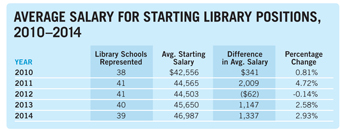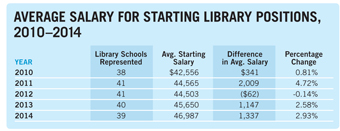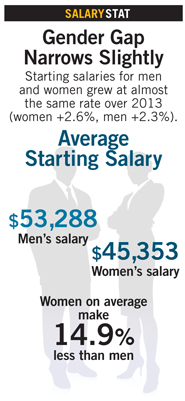Placements & Salaries 2015: The Expanding Info Sphere

Library and information science (LIS) graduates are finding their place in a market that demands creativity, flexibility, and a solid set of LIS skills that represent the profession’s foundations and future. This year’s list of job titles reflects ones we know well from the bedrock of our field (children’s librarian, reference librarian) and those that are less familiar from the frontiers ahead (content strategy consultant, data steward). However, familiarity can be an illusion. In many cases, jobs with the same title list very different sets of job responsibilities. Answering this challenge requires job seekers to identify desired skill sets very carefully and to consider jobs with unfamiliar titles. Future job seekers may want to consider this competency-based approach when conducting their job search.
 This year 37 of the 52 LIS schools in the United States reported there were 4,331 graduates in 2014, with 31.8% (1,379 graduates) of these graduates participating in the LJ survey. Overall, 2014 graduates successfully found jobs, with 83% of those responding to the employment status question saying they have full-time employment (though not necessarily in a library). This is a marked increase over the 69.6% reported last year for the 2013 graduates. The average starting salary also has improved, to $46,987, up 2.9% over 2013.
This year 37 of the 52 LIS schools in the United States reported there were 4,331 graduates in 2014, with 31.8% (1,379 graduates) of these graduates participating in the LJ survey. Overall, 2014 graduates successfully found jobs, with 83% of those responding to the employment status question saying they have full-time employment (though not necessarily in a library). This is a marked increase over the 69.6% reported last year for the 2013 graduates. The average starting salary also has improved, to $46,987, up 2.9% over 2013.
Although success in finding a job was high, the search process demanded perseverance and preparation. Applicants faced significant challenges including concerns over qualifying for “entry level” jobs that require previous experience; well-saturated local markets, particularly in areas with LIS schools; and the need to have strong in-person social networking skills. Successful completion of a search required being well prepared for the process, stamina to stay engaged over the longer term, and willingness to adjust expectations. One troubling indicator is that unemployment has increased over last year, to 5.9%.
LIS schools reported that the hiring market for LIS students was healthy, which is supported by the high number of graduates reporting full-time employment and rising salary levels. More than a quarter of the schools reported an increase in available positions, and only 18% recorded a decrease in positions. Some schools (11%) also reported that salary levels were higher than last year, while only 3% of schools reported that the salary level had dropped. This was supported by the results of the graduate survey.
 Salary levels
Salary levels
The salary picture for 2014 graduates is generally good news. Among the 1,156 graduates who shared their salary information, the average salary level is $46,987, an increase of 2.9% over last year. Salary levels for both women and men show increases, with women’s salaries displaying a slightly stronger increase (up 2.6% to $45,353) than men’s salaries (up 2.3% to $53,288). Interestingly, this year men have greater representation in the results than they did last year. For 2014, the ratio is 77.8% women to 22.2% men, versus last year’s ratio of 81.4% women to 18.6% men.

Salary by region
Regionally there is considerable variation in salary levels. (This year’s regional designations were not directly comparable to last year’s, so changes from last year will not be reported.) Graduates holding jobs in the Pacific states report the highest average salary, $63,987, which is 36.2% higher than the overall average salary. Those graduates with jobs in the Southeast reported the lowest average salary, $41,073, which is 12.6% below this year’s overall average. The distance between these salary levels likely reflects more than just a regional cost of living (COL) standard since it is nearly double the COL differential computed for two well-known cities in these regions (22% difference between Portland, OR, and Charleston, SC). Those graduates employed outside the United States also commanded salaries near the top of the scale, at $63,615. Salary levels for jobs in the Midwest, $47,401, and the Northeast, $46,464, are close to the overall average. Workers in the Mountain states have an average salary of $42,716.
 Salary by job title
Salary by job title
Job titles provided marked differences between salary level. The top five highest average salaries are for jobs that have less traditional titles. These include software engineer/developer ($85,450), usability designer/researcher ($78,075), data analyst/scientist ($72,571), digital asset manager ($62,167), and business analyst ($55,083). Outreach librarian ($51,558) and systems librarian ($50,400) are also at salary levels more than 7% above the overall average salary.
 School library media specialist has a salary ($50,362) that is also 7% above the overall average salary, however, those graduates employed with the title school librarian are about 2% below the average salary.
School library media specialist has a salary ($50,362) that is also 7% above the overall average salary, however, those graduates employed with the title school librarian are about 2% below the average salary.
Other job titles that have salaries at or above the overall average are collection development librarian ($50,200), research librarian ($49,992), head librarian ($48,825), and metadata librarian ($47,500).
The five job titles at the lowest salary levels are library technical assistant ($29,560), library associate ($31,090), library specialist ($34,083), assistant director ($34,400), and library technician ($34,975). Many of these titles suggest that they may be jobs that do not require professional training. This highlights a theme that emerged from the survey participants’ comments about the job search: frustration for those graduates who found themselves employed in a job that did not require their degree.
RELATED
ALREADY A SUBSCRIBER? LOG IN
We are currently offering this content for free. Sign up now to activate your personal profile, where you can save articles for future viewing









Add Comment :-
Comment Policy:
Comment should not be empty !!!